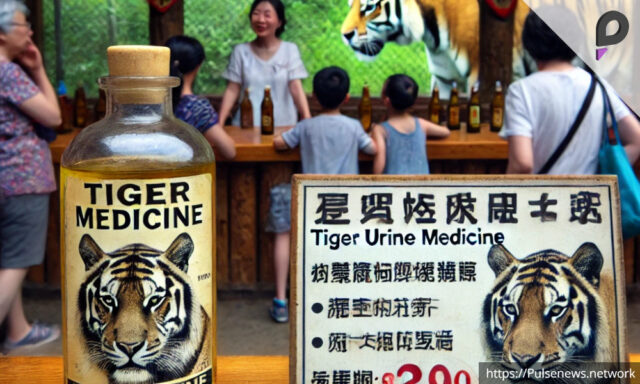BEIJING: A zoo in China has sparked controversy by selling tiger urine as a remedy for rheumatism. The Yaan Bifengxia Wildlife Zoo in Sichuan province offers 250g bottles for 50 yuan ($7). A recent visitor shared this discovery online, raising safety concerns. The product’s claimed benefits remain unproven.
Tiger Urine Marketed as a Medical Cure
The zoo advertises tiger urine as a treatment for rheumatoid arthritis, sprains, and muscle pain. The bottle’s instructions recommend mixing it with white wine and applying it with ginger. The zoo also suggests oral consumption but advises discontinuing use if allergies occur. Experts warn there’s no scientific evidence supporting its medicinal claims.
How the Urine Is Collected and Sold
A zoo staff member revealed that urine is collected from a basin after tigers urinate. The process of disinfection remains unclear. Staff stated that sales are “average,” with a maximum of two bottles sold daily. In 2014, the zoo gave tiger urine to celebrities as a prize in a reality show.
Medical Experts Reject Claims
A pharmacist from Hubei Provincial Traditional Chinese Medicine Hospital dismissed the claims about tiger urine’s medicinal value. He criticized exaggerations that distort Chinese medicine and harm tiger conservation. He urged people to seek proper medical advice rather than using unverified remedies.
Regulatory and Ethical Concerns
A traditional medicine practitioner questioned the zoo’s qualifications to sell medicinal products. All medicines must receive government approval before sale. Despite criticism, the zoo insists it holds a business license allowing tiger urine sales. Authorities have not commented on whether investigations will follow.
Social Media Reactions Go Viral
The issue quickly gained traction on social media, amassing over 35 million views. One visitor bought a bottle for his father but saw no effects. Another user planned to try it for their mother, believing there were no side effects. Some questioned the hygiene risks of consuming animal urine.
Tigers in Chinese Culture and Conservation Laws
Tigers symbolize strength and bravery in Chinese traditions. Some ancient texts claim tiger bones can treat illnesses, though China has banned their use. Since tigers are critically endangered, hunting them carries up to 10 years in prison. Conservationists worry such products could encourage illegal wildlife trade.
Public Skepticism and Future Implications
Despite cultural beliefs, experts stress there’s no scientific backing for these claims. Many call for stricter regulation of animal-based remedies. The controversy highlights ongoing debates about traditional medicine, animal ethics, and conservation efforts in China.











